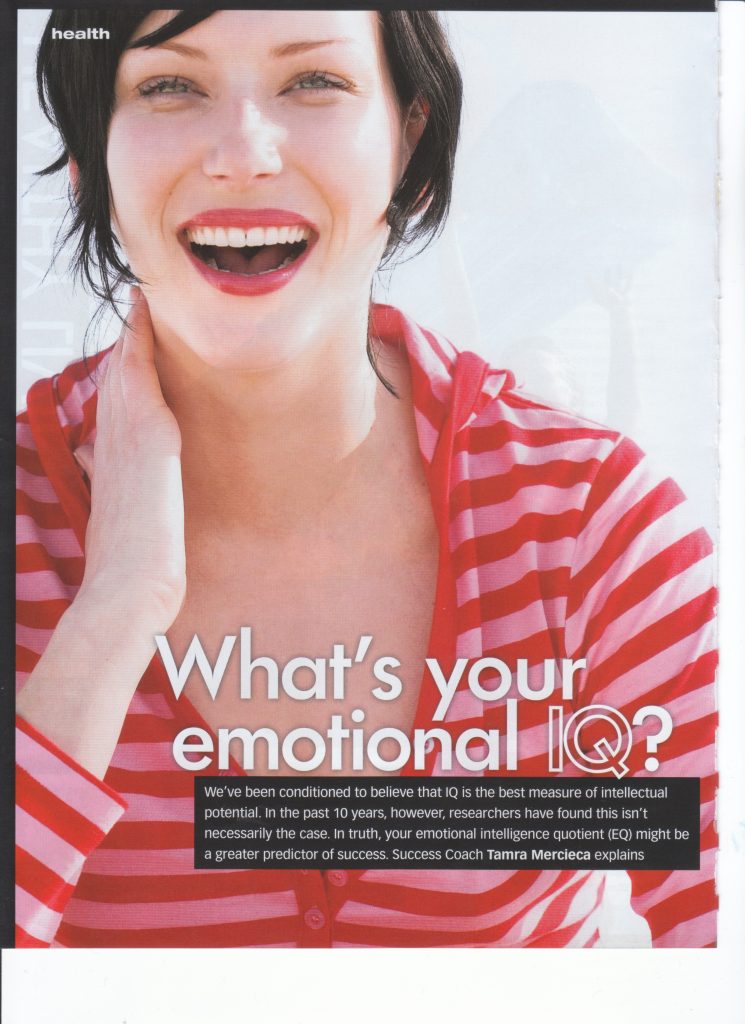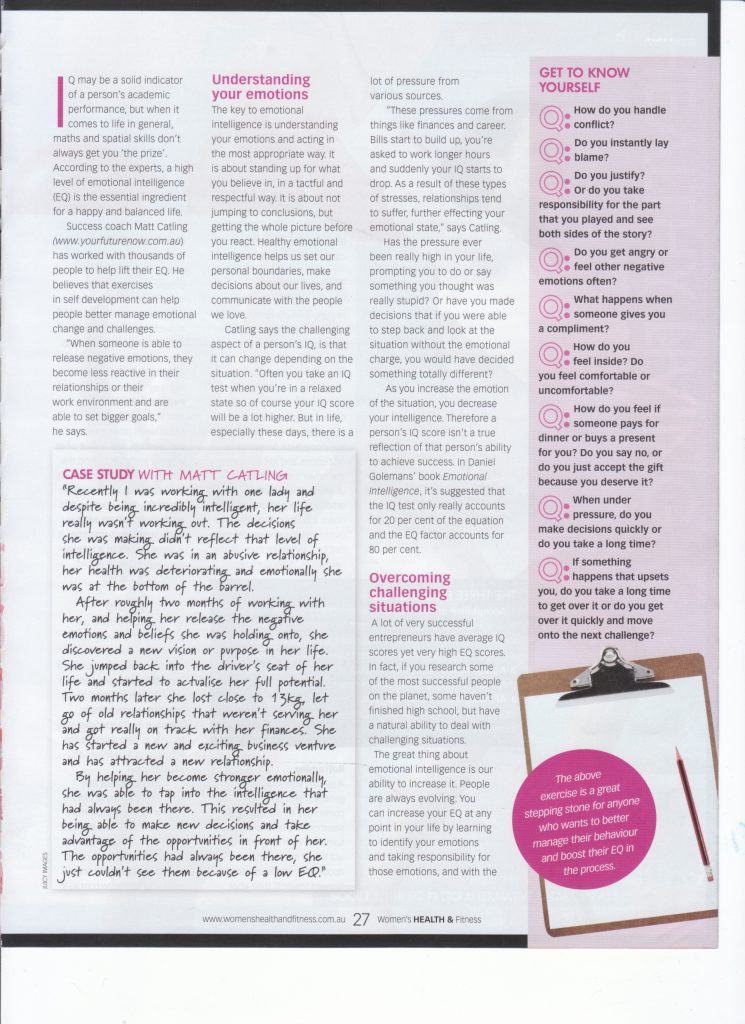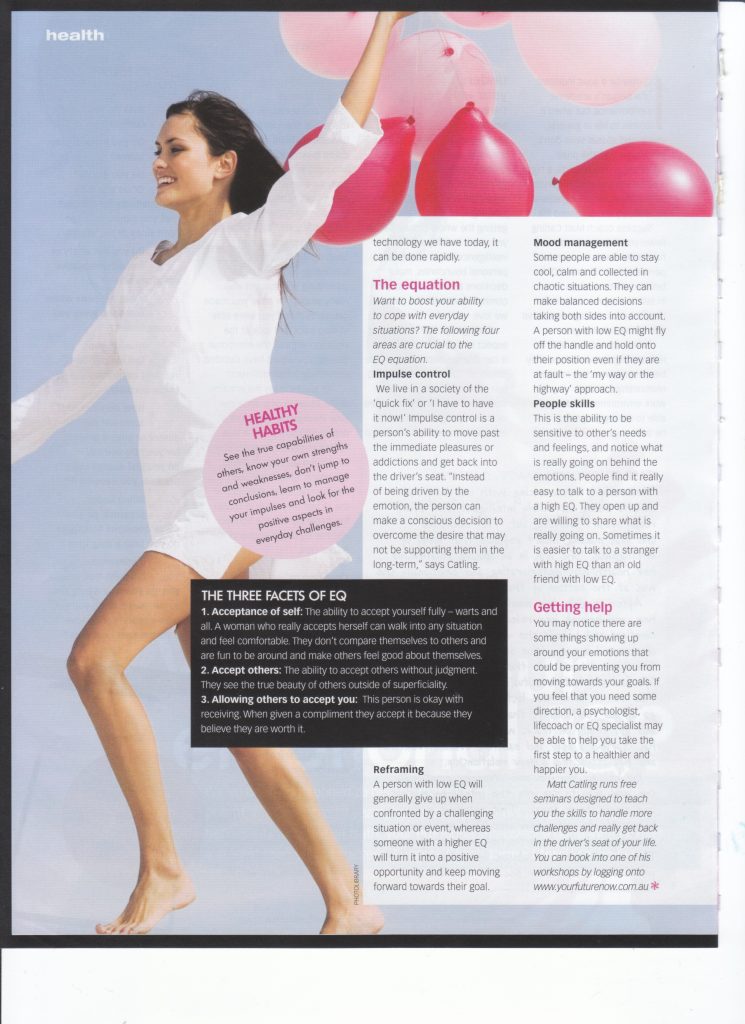


What’s your emotional IQ (or EQ)?
We’ve been conditioned to believe that IQ is the best measure of human potential. In the past ten years, however, researchers have found this isn’t necessarily the case. In actuality, your emotional intelligence quotient (EQ) might be a greater predictor of success. Success Coach Tamra Mercieca explains.
IQ may be a solid indicator of a person’s academic performance, but when it comes to life in general, math and spatial skills don’t go far enough. One of the major missing parts in the success equation is emotional intelligence. Some researchers now believe that EQ will tell you more about a person’s ability than measuring their IQ scores.
Master Coach Matt Catling has worked with thousands of people to help lift their EQ. He says those who work on themselves from a personal development point of view, are more in touch with their emotions and can handle more challenges. “When someone is able to release negative emotions, they become less reactive in their relationships or their work environment and are able to set bigger goals.”
Matt explains: “Recently I was working with one lady and despite being incredibly intelligent, her life really wasn’t working out. The decisions she was making didn’t reflect that level of intelligence. She was in an abusive relationship, her health was deteriorating and emotionally she was at the bottom of the barrel.
After roughly two months of working with her, and helping her release the negative emotions and beliefs she was holding onto, she discovered a new vision or purpose in her life. She jumped back into the driver’s seat of her life and started to actualize her full potential. Two months later she lost close to 13kg, let go of old relationships that weren’t serving her and got really on track with her finances. She has started a new and exciting business venture and has attracted a new relationship.
By helping her become stronger emotionally, she was able to tap into the intelligence that had always been there. This resulted in her being able to make new decisions and take advantage of the opportunities in front of her. The opportunities had always been there, she just couldn’t see them because of a low EQ.”
The key to emotional intelligence is understanding your emotions and acting in the most appropriate way. It is about standing up for what you believe in, in a tactful and respectful way. It is about not jumping to conclusions, but getting the whole picture before you react. Healthy emotional intelligence helps us set our personal boundaries, make decisions about our lives, and communicate with the people we love.
Catling says the challenging thing with a person’s IQ, is that it can change depending on the situation. “Often you take an IQ test when you’re in a relaxed state so of course your IQ score will be a lot higher. But in life, especially these days, there is a lot of pressure from various sources.”
“These pressures come from things like finances and career. Bills start to build up, you’re asked to work longer hours and suddenly your IQ starts to drop. As a result of these types of stresses, relationships tend to suffer, further effecting your emotional state.”
Has the pressure ever been really high in your life, prompting you to do or say something you thought was really stupid? Or have you made decisions that if you were able to step back and look at the situation without the emotional charge, you would have decided something totally different?
As you increase the emotion of the situation, you decrease your intelligence. Therefore a person’s IQ score isn’t a true reflection of that person’s ability to achieve success. In Daniel Golemans’ book Emotional Intelligence, it’s suggested that the IQ test only really accounts for 20% of the equation and the EQ factor accounts for 80%.
It makes sense then, why a lot of very successful entrepreneurs have average IQ scores yet very high EQ scores. In fact, if you research some of the most successful people on the planet, some haven’t finished high school, yet have a natural ability to deal with challenging situations and overcome them.
The great thing about emotional intelligence is our ability to increase it. People are always evolving. You can increase your EQ at any point in your life by learning to identify your emotions and taking responsibility for those emotions, and with the technology we have today, it can be done rapidly.
Lets take a closer look at what constitutes EQ
Impulse Control: We live in a society of the ‘quick fix’ or ‘I have to have it Now!’ Catling says impulse control is a person’s ability to move past the immediate pleasures or addictions and get back into the driver’s seat. “Instead of being driven by the emotion, the person can make a conscious decision to overcome the desire that may not be supporting them in the long-term.”
Reframing: A person with low EQ will generally give up when confronted by a challenging situation or event, whereas someone with a higher EQ will turn it into a positive opportunity and keep moving forward towards their goal.
Mood management: Some people are able to stay cool, calm and collected in chaotic situations. They can make balanced decisions taking both sides into account. A person with low EQ might fly off the handle and hold onto their position even though if they at fault – the ‘my way or the highway’ position.
People skills: This is the ability to be sensitive to other’s needs and feelings, and notice what is really going on behind the emotions. Often people find it really easy to talk to a person with high EQ. They open up and are willing to share what is really going on.
The three faces of EQ
Acceptance of self: The ability to accept yourself fully, warts and all. A person who really accepts themself, can walk into any situation and feel comfortable. They don’t compare themselves to others and are fun to be around and make others feel good about themselves.
Accept others: The ability to accept others without judgment. They see the true beauty of others outside of superficiality.
Allowing others to accept us: This person is ok with receiving. When given a compliment they accept it because they believe they are worth it.
Check your EQ by answering these questions:
- How do you handle conflict? Do you instantly lay blame? Do you justify? Or do you take responsibility for the part that you played and see both sides of the story?
- Do you get angry or feel other negative emotions often?
- What happens when someone gives you a compliment? How do you feel inside? Do you feel comfortable or uncomfortable?
- How do you feel if someone pays for dinner or buys a present for you? Do you say no, or do you just accept the gift because you deserve it?
- When under pressure, do you make decisions quickly or do you take a long time?
- If something happens that upsets you, do you take a long time to get over it or do you get over it quickly and move onto the next challenge?
You may notice there are some things showing up around your emotions that could be preventing you from moving towards your goals. If you’d like to improve your EQ, feel free to check out my One-on-One Intensive where we clear our unresolved emotions and how to become more in tune with your feelings.
